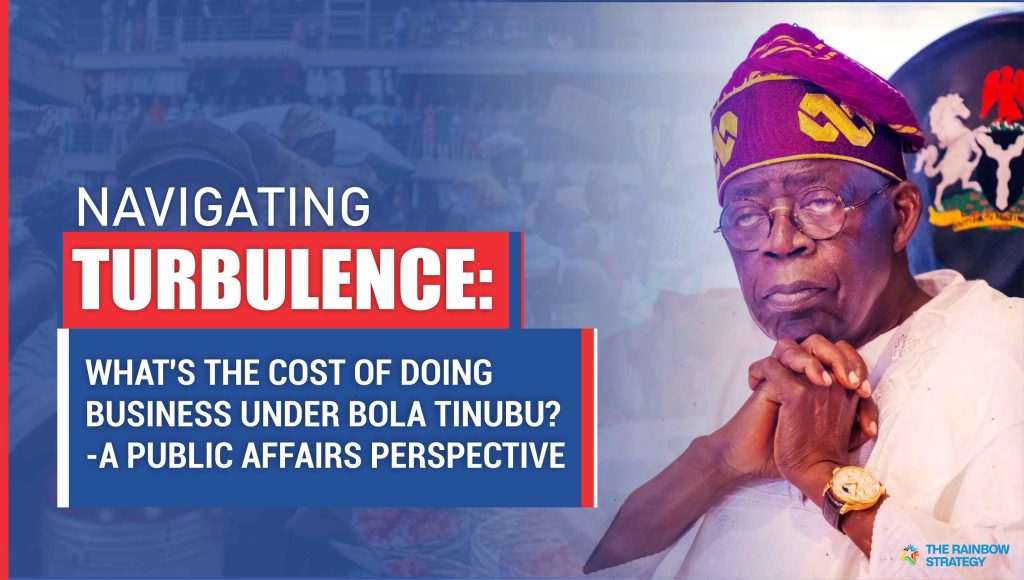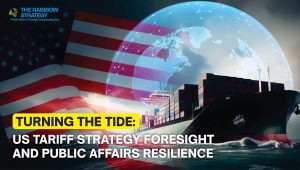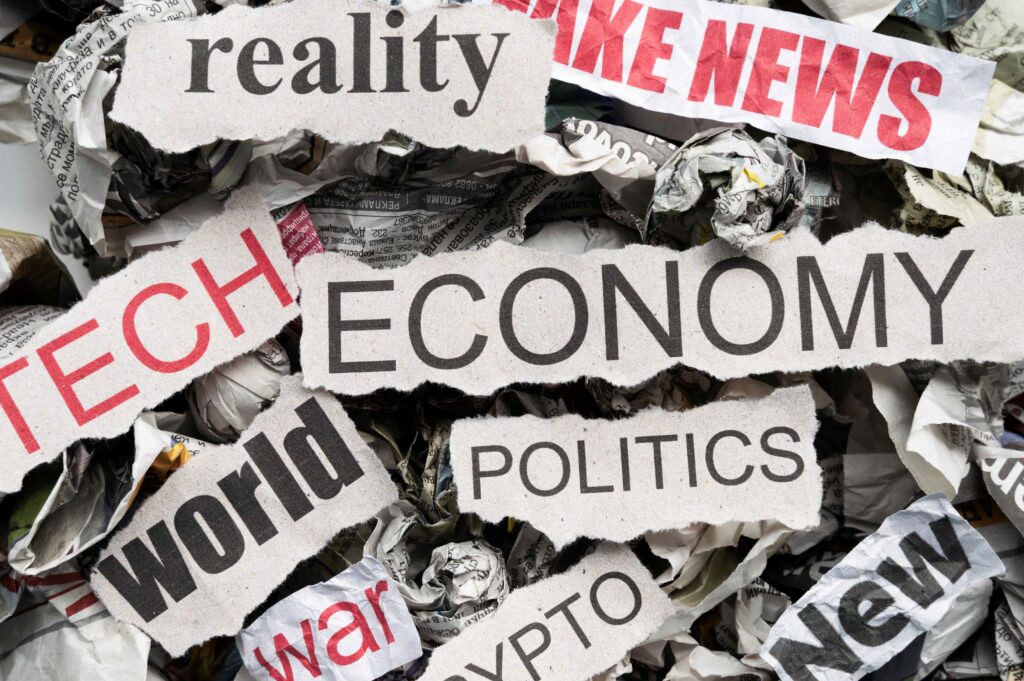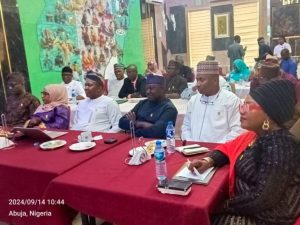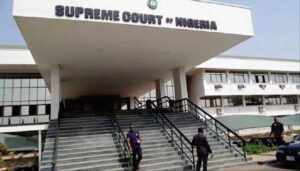Almost two years since President Bola Ahmed Tinubu assumed office on May 29, 2023, Nigeria’s business ecosystem has been thrust into a period of unprecedented turbulence. His administration’s bold economic reforms—most notably the removal of fuel subsidies and the unification of currency exchange rates—have reshaped the economic landscape, while the recent declaration of a state of emergency in Rivers state has introduced new layers of political complexity. These developments have dramatically increased the cost of doing business for Nigeria’s private sector, which ranges from small and medium-sized enterprises (SMEs) to multinational corporations.
At The Rainbow Strategy, we believe that understanding these changes through the lenses of public affairs, reputation management, and crisis management will be critical for businesses navigating this challenging environment. Therefore, this is our analysis of Tinubu’s policies and their implications for the economy, alongside insights into whether companies should incorporate political risk strategies into their operations.
The Policy Shifts: Short-Term Pain, Long-Term Gain?
Tinubu wasted no time implementing his campaign promises. On his first day in office, he announced the immediate removal of fuel subsidies, a policy that had long been a fiscal burden on the government. Overnight, fuel prices surged from ₦192 to over ₦500 before stabilizing at ₦950 (based on today’s pump price). Shortly after, the administration unified Nigeria’s multiple currency exchange rates, causing the Naira to plummet from an average of 460.702 NGN/USD to highs of N1600/USD.
Expectedly, these reforms were framed as necessary steps toward economic recovery. The fuel subsidy, which cost the government billions annually, was seen as unsustainable, while currency unification aimed to create a transparent, market-driven exchange rate system. Tinubu and his officials have consistently defended these moves, arguing they will attract foreign investment and reduce fiscal deficits.
Economic Fallout
The immediate consequences have been severe. According to the National Bureau of Statistics (NBS), inflation has soared to an 18-year high of 24.8%, driven largely by higher energy and transportation costs, while Naira’s sharp decline has made imports prohibitively expensive, hitting businesses reliant on foreign goods and services. These have put heavy strain on the private sector. The Nigerian Economic Summit Group (NESG) estimates that approximately 7.2 million businesses—potentially 30% of Nigeria’s 24 million MSMEs—have shut down since 2023. Multinationals like GSK, P&G and many others have also exited, citing unviable conditions.
For businesses, the ripple effects are stark. Rising fuel costs have inflated operational expenses, particularly for those dependent on generators due to Nigeria’s unreliable power grid. Supply chain disruptions and shrinking consumer purchasing power have compounded the pressure.
Public Affairs Perspective
From a public affairs standpoint, the Tinubu administration’s communication has been a mixed bag. The government has leaned on a narrative of “necessary sacrifice” for long-term prosperity, but the absence of robust relief measures has undermined this messaging. Public discontent is palpable—protests have erupted, and social media reflects growing frustration, especially among the youth and urban middle class. Effective stakeholder engagement and transparent communication will be essential to maintain legitimacy and trust.
Reputation Management Challenges
Reputation-wise, Tinubu’s government has been facing a delicate balancing act. There is the international praise situation where the IMF and World Bank have lauded the reforms as steps toward fiscal discipline, boosting Nigeria’s image among global investors, and the domestic backlash environment led by the labour unions, business associations, and citizens that have been criticising the lack of a clear mitigation plan, eroding domestic goodwill.
The administration’s ability to manage this dual narrative—projecting competence abroad while addressing discontent at home—will shape its long-term reputation.
Rivers State: A Political Wildcard
On the political front, Tinubu’s declaration of a state of emergency in Rivers state recently has raised eyebrows. This extraordinary power, enshrined in the 1999 Constitution (as amended), allows the president to assume control of a state’s affairs in cases of severe threats to public safety, national security, or governance. The suspension of Governor Siminalayi Fubara, his deputy, and the state House of Assembly for six months—backed by a controversial National Assembly voice vote—marks a significant escalation.
While the constitution permits such action, it is subject to strict provisions to prevent abuse. Critics, including the People’s Democratic Party (PDP), have called it an overreach, questioning whether the situation in Rivers state meets the legal threshold. Legal and political analysts remain divided, with some warning of a slide toward authoritarianism.
Economic and Business Implications
No doubt, Rivers state is in no ordinary region—the South-South region is an economic powerhouse, hosting Nigeria’s oil and gas industry. The state of emergency introduces uncertainty that could disrupt operations of companies in the energy sector which may face supply chain interruptions or security risks. The uncertainty may also deter investment as political instability could scare off investors, particularly in a region critical to national revenue.
Crisis Management Lens
From a crisis management perspective, the government’s handling of this situation is under scrutiny. Suspending elected officials risks inflaming tensions, potentially leading to unrest or violence. The administration must justify the action through clear, evidence-based communication to legitimize the declaration. It must also mitigate the fallout by deploying proactive engagement with stakeholders—political, business, and civil society—which will be key to stabilizing the region.
The stakes are high. A misstep could exacerbate Nigeria’s already fragile political climate, with ripple effects on the economy.
The Cost of Doing Business: A Public Affairs Takeaway

Tinubu’s reforms and the Rivers state crisis have converged to create a perfect storm for Nigeria’s private sector. The cost of doing business has risen sharply, driven by:
- Economic Shocks: Inflation, currency devaluation, and energy costs have squeezed profitability.
- Political Risks: The state of emergency underscores the potential for governance disruptions that could impact operations.
For businesses, survival hinges on adaptability. From a public affairs perspective, companies must also manage their narratives—balancing relationships with a polarizing government, frustrated customers, and wary investors.
Should Businesses Adopt Political Risk Strategies?
Absolutely. The current environment demands a proactive approach to political risk. Here’s why and how:
- Economic Volatility
- Why: Inflation and Naira devaluation create an unpredictable cost structure.
- How: Hedge against currency fluctuations, localize supply chains, and optimize costs.
- Political Instability
- Why: The Rivers state crisis highlights the risk of sudden governance shifts.
- How: Conduct scenario planning and develop contingency plans for disruptions.
- Reputation Risks
- Why: Aligning too closely with the government—or distancing too far—could alienate key stakeholders.
- How: Adopt a neutral, stakeholder-centric communication strategy.
- Building Resilience
- Why: Diversification reduces exposure to sector-specific shocks.
- How: Explore opportunities in less volatile sectors like technology or renewables.
Conclusion: Strategic Foresight in Uncertain Times
Under Tinubu’s leadership, Nigeria’s business landscape is a high-stakes arena of risk and opportunity. The economic reforms promise long-term gains but deliver immediate pain, while the Rivers state emergency tests the government’s crisis management mettle. For businesses, the cost of operating has never been higher—nor has the need for strategic foresight been more urgent.
Finally, we urge companies to integrate political risk strategies into their playbooks. Navigating this uncertainty requires not just resilience but a nuanced understanding of public affairs dynamics. The government’s success in managing its reputation and crises will shape the broader environment—but businesses must take charge of their own destinies.


